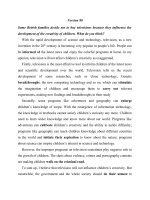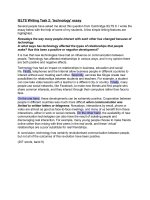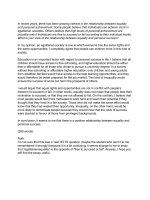writing ielts TELEVISION
Bạn đang xem bản rút gọn của tài liệu. Xem và tải ngay bản đầy đủ của tài liệu tại đây (149.56 KB, 3 trang )
Version 80
Some British families decide not to buy televisions because they influence the
development of the creativity of children. What do you think?
With the rapid development of science and technology, television, as a new
invention in the 20
th
century is becoming very popular in people’s life. People can
be informed of the latest news and enjoy the colorful programs at home. In my
opinion, television will not affect children’s creativity as exaggerated.
Firstly, television is the most effective tool to inform children of the latest news
and scientific development over the world. Television tells us the recent
development of some researches, such as clone technology, Genetic
breakthroughs, the new computing technology and so on, which can stimulate
the imagination of children and encourage them to carry out relevant
experiments, making new findings and breakthroughs in their study
Secondly, some programs like adventures and geography can enlarge
children’s knowledge of scope. With the emergence of information technology,
the knowledge in textbooks cannot satisfy children’s curiosity any more. Children
need to learn wider knowledge and know more about our world. Programs like
adventures can cultivate children’s creativity and the ability to tackle difficulty;
programs like geography can teach children knowledge about different countries
in the world and initiate their aspiration to know about the nature; programs
about science can inspire children’s interest in science and technology.
However, the improper programs on television sometimes play negative role in
the growth of children. The shots about violence, crimes and pornography contents
are making children walk on the criminal road.
To sum up, I believe that television will not influence children’s creativity. But
meanwhile, the government and the whole society should do their utmost to
prohibit the unhealthy contents on TV and provide the children with a clean
growing environment (275 words)
(March, 16, 2002 Shenzhen)
1)carry something out
to perform a task; to perform an assignment. "This is a very important job," said Jane. "Do you think you
can carry it out?" The students didn't carry out their assignments.
2)break‧through [countable]
an important new discovery in something you are studying, especially one made after trying for a
long time
breakthrough in
Scientists have made a major breakthrough in the treatment of cancer.
3) stim‧u‧late [transitive]
to encourage someone by making them excited about and interested in something:
Her interest in art was stimulated by her father.
stimulate somebody to do something
An inspiring teacher can stimulate students to succeed.
4) in‧form [transitive] formal
1 to officially tell someone about something or give them information
inform somebody about/of something
Please inform us of any change of address as soon as possible.
5) tell of somebody/something
phrasal verb
to describe an event or person:
The poem tells of the deeds of a famous warrior.
6) utmost [singular]
the most that can be done
to the utmost
Both runners had pushed themselves to the utmost.
The medical staff did their utmost (=tried as hard as they could) to save the patient's life.
7) en‧large [intransitive and transitive]
if you enlarge something, or if it enlarges, it increases in size or scale:
8) cul‧ti‧vate [transitive]
3 to work hard to develop a particular skill, attitude, or quality:
9) i‧ni‧ti‧ate [transitive]
1 formal to arrange for something important to start, such as an official process or a new plan:









